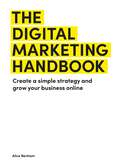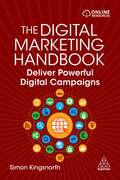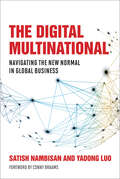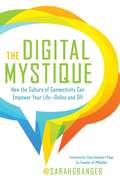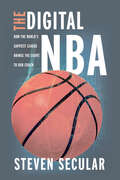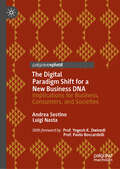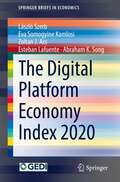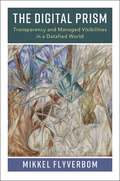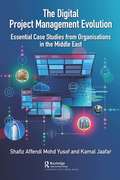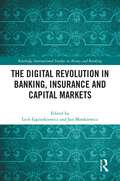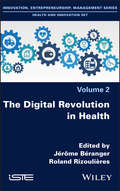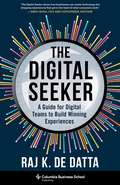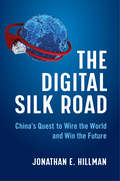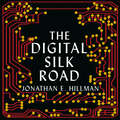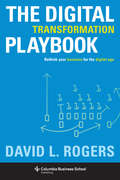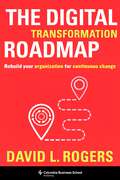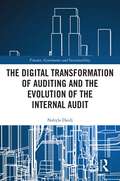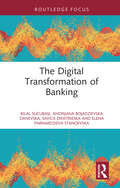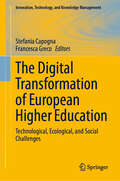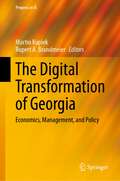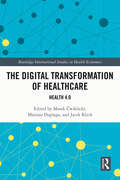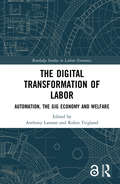- Table View
- List View
The Digital Marketing Handbook: Create a simple strategy and grow your business online
by Alice BenhamFrom strategist, speaker and podcaster Alice Benham comes The Digital Marketing Handbook - an expert guide covering the fundamentals of marketing, filled with case studies and interviews with industry insiders.There's so much marketing expertise out there but how should people know what to listen to? How to implement it? Or where to start? By covering the fundamentals of marketing, this book will act as a north star for small business owners looking to grow. Like Alice herself, the book is honest, practical, engaging and actionable - no fluff or complication allowed - and will help you build a community, get visible and make sales. Rooted in theory but with real-life experiences and case studies from entrepreneurs who have made digital marketing work for them, the book will leave you with the clarity and systems to take your business to the next level. An indispensable resource for small business owners, freelancers, entrepreneurs and marketing students.Here's what to expect from the book:Proven and practical expertise Clear definitions (no jargon!) Quick tips Examples and case studies Insights from trusted experts Chapter summaries for easy reminders Action steps for every topic
The Digital Marketing Handbook: Create a simple strategy and grow your business online
by Alice BenhamFrom strategist, speaker and podcaster Alice Benham comes The Digital Marketing Handbook - an expert guide covering the fundamentals of marketing, filled with case studies and interviews with industry insiders.There's so much marketing expertise out there but how should people know what to listen to? How to implement it? Or where to start? By covering the fundamentals of marketing, this book will act as a north star for small business owners looking to grow. Like Alice herself, the book is honest, practical, engaging and actionable - no fluff or complication allowed - and will help you build a community, get visible and make sales. Rooted in theory but with real-life experiences and case studies from entrepreneurs who have made digital marketing work for them, the book will leave you with the clarity and systems to take your business to the next level. An indispensable resource for small business owners, freelancers, entrepreneurs and marketing students.Here's what to expect from the book:Proven and practical expertise Clear definitions (no jargon!) Quick tips Examples and case studies Insights from trusted experts Chapter summaries for easy reminders Action steps for every topic
The Digital Marketing Handbook: Deliver Powerful Digital Campaigns
by Simon KingsnorthBuild, implement and optimize your digital marketing campaigns, with this indispensable guide which covers everything from SEO, social media, paid search and display advertising. The Digital Marketing Handbook takes the reader step by step through the various components of B2B and B2C online marketing, making it an essential companion to every marketer's desk. Highly practical in approach, it features tips, platform recommendations and common pitfalls to watch out for, as well as examples from global brands including Google, Amazon and Nissan. Detailed guidance is provided for key areas such as creating content that excites, informs and converts, using marketing automation and analyzing your results to maximize performance. Written by recognized industry expert and bestselling author, Simon Kingsnorth, The Digital Marketing Handbook brings together reliable and actionable insights into one complete resource. Also covering how to manage affiliates and partnerships to deliver highly targeted leads and provide customer service that achieves high review scores and builds loyalty, it is accompanied by online templates and interactive tools to use in practice. This book is an essential blueprint for marketing professionals to deliver the best results from their digital marketing campaigns.
The Digital Mom Handbook
by Colleen Padilla Audrey McclellandFrom the founders of ClassyMommy.com and MomGenerations.com comes the ultimate guide to helping moms build successful careers at home by doing what they already do online-just better. To work or not to work-it's the toughest question for most mothers today. But Audrey McClelland and Colleen Padilla have found the coveted "middle ground," creating successful careers from home via the Internet. They've literally Skyped, blogged, vlogged, tweeted, and Facebooked their way to the top-and in this eye-opening book they show other moms how to find success through these seven basic steps: 1. Find your passion. 2. Hang a digital "shingle" and start typing. 3. Find your tribe. 4. Make opportunity knock and learn how to answer that door. 5. Manage the Benjamins. 6. Don't forget the children! 7. Live happily ever after by living your values.
The Digital Multinational: Navigating the New Normal in Global Business (Management on the Cutting Edge)
by Satish Nambisan Yadong LuoHow multinational companies can use digital technology to compete in a world where business is driven by the forces of both globalization and deglobalization.Digital technology has put globalization on steroids; multinational companies now account for one-third of world GDP and one-fourth of world employment. And yet complicating this story of unchecked global capitalism are two contradictory forces. Even as advances in digital technology enable borderless markets, a new nationalism has emerged, reviving protectionism and railing against digital colonialism. In The Digital Multinational, management experts Satish Nambisan and Yadong Luo examine how companies can adopt a dual strategy to cope with this new normal: harnessing the power of digital technology while adapting to the geopolitical realities of particular markets. Key to success, Nambisan and Luo explain, is the notion of tight and loose coupling to characterize the relationship of the digital multinational to its global partners and subsidiaries. Identifying the tightness-looseness requirements of global business connectivity leads to successful business strategy. Drawing on real-world examples that include Burberry&’s entrance into the Chinese market, Unilever&’s AI-powered global talent marketplace, and the Vocal for Local movement in India, they develop a typology of global business contexts; discuss digital strategies for entering new markets, establishing digital platforms, managing globally dispersed activities, and pursuing innovation; and explain how these strategies can be part of a business leader&’s toolkit. The Digital Multinational is an essential guide to competing in a business world driven by both globalization and deglobalization.
The Digital Mystique
by Sarah GrangerIn The Digital Mystique, Sarah Granger-a nationally recognized expert on online culture and social technology-shows us how digital media is shaping our lives in real time. Whether it's how we raise our children, communicate in love and partnerships, support causes, or establish friendships and trust, Granger pinpoints the best ways to seize digital opportunities to make our lives richer and fuller.While the Internet era is one that is frequently criticized as undermining our health, privacy, concentration, and ability to sustain real-world relationships, Granger takes a more optimistic and empowering view. She shares real-life stories and surprising facts about our lives-both online and off-to shed new and fascinating light on the positive effects of the digital media revolution, showing us how we can personally learn, grow, and thrive by engaging in our digitized world.The Digital Mystique includes the following chapters:Connecting Is Just the Beginning.YOUFriending Is TrendingLove in the Time of MessagingThe Kids Are OnlineThe Senior MomentThe Passion of the WebThere's No Business Like E-BusinessCommunity Is the KeyThe Difference a Tweet MakesWhat We Leave BehindA Stitch in Digital Time
The Digital NBA: How the World's Savviest League Brings the Court to Our Couch (Studies in Sports Media)
by Steven SecularThe National Basketball Association reaches a global audience via a multiplatform strategy that leverages its uncanny ability to connect fans to all things NBA. Steven Secular brings readers inside the league’s global operations and traces the history of the NBA’s approach to sports media from its 1980s embrace of cable through the streaming revolution of the twenty-first century. As fans around the world stream games and other league content, NBA teams incorporate foreign languages and cultures into broadcasts to boost their product’s appeal to audiences in Brazil, China, and beyond. Secular’s analysis reveals how the NBA continues to transform itself into a wildly successful media producer and distributor more akin to a streaming studio than the sports leagues of old even as its media partners and sponsors erase any notion of sports as a civic good. A timely look at a dynamic media landscape, The Digital NBA shows how the games we love became content first and sport a distant second.
The Digital Paradigm Shift for a New Business DNA: Implications for Business, Consumers, and Societies
by Andrea Sestino Luigi NastaThis book explores the crucial role of “remembering” the fundamental purpose of firms’ existence especially in today’s context: Meeting individuals’ and societal needs. Through seven chapters, the book shed light on the issue of the integration of new technologies within value propositions, by examining their positive impacts on both individual and societal wellbeing. Beginning with an examination of evolving consumers expectations and the core mission of companies, it proceeds through a rigorous analysis of digital technologies impact on wellbeing. Chapters intricately explore themes such as the adoption of mobile health technologies, the role of AI in shaping positive emotions, and the transformative potential of gamification in cultural heritage experiences. Nonetheless, a qualitative examination of sustainable digital business models offering practical insights into fostering wellbeing through technological innovation is also presented. Ultimately, the book culminates in a holistic discussion on integrating digital technologies to enhance collective wellbeing, offering comprehensive insights and conclusive trajectories for future considerations. The book also offers some Case Studies and specialists’ perspectives exploring real success stories deriving from firms, managers, scholars and practitioners committed to the mission of positively integrating managing new technologies. With a preface by Prof. Yogesh Dwivedi, and Prof. Paolo Boccardelli.
The Digital Platform Economy Index 2020 (SpringerBriefs in Economics)
by Zoltan J. Acs László Szerb Esteban Lafuente Eva Somogyine Komlosi Abraham K. SongThis book presents the 2020 Digital Platform Economy Index (DPE Index). The DPE Index integrates two separate but related literatures on ecosystems, namely, the digital ecosystem and the entrepreneurial ecosystem. This new framework situates digital entrepreneurship within the broader context of users, platforms, and institutions, such that two biotic entities (users and agents) actuate individual agency, and two abiotic components (digital infrastructure and digital platforms) form the external environment. The DPE Index framework includes 12 pillars that integrate the digital and the entrepreneurship ecosystems. Here, the authors report on the DPE Index, the four sub-indices, and the 12 pillar values for 116 countries as well as provide a cluster analysis based on the 12 pillars.
The Digital Prism: Transparency and Managed Visibilities in a Datafied World
by Mikkel FlyverbomMany people are concerned about the unchecked powers of tech giants and the hidden operations of big data and algorithms. Yet we do not have the vocabularies to properly articulate how these digital transformations shape our lives. This book shows how the management of visibilities - our digital footprints - is a central force in the digital transformation of societies and politics. Seen through the prism of digital technologies and data, the lives of people and structuring of organizations take new shapes in our understanding. Making sense of these requires that we push beyond common ways of thinking about transparency and surveillance, and look at how managing visibilities is a central but overlooked force that influences how people live, how organizations work and how societies and politics operate.
The Digital Project Management Evolution: Essential Case Studies from Organisations in the Middle East
by Kamal Jaafar Shafiz Affendi Mohd YusofProject management dates back to the 19th century when Henry Gantt developed techniques for planning and controlling projects, including his widely used Gantt chart. The growth of modern project management later in the century came as a result of the necessity of structured manufacturing, transportation, and construction industries. Currently, software developers in the information technology (IT) industry are concerned with the techniques of project management which make the assumption projects are predictable. In reality, unforeseen changes have occurred in almost all projects to date. The inability to accommodate such changes leads to wasted time, money, and resources. Hence, the project management discipline must continuously offer theories, methods, and approaches that raise the key question: how do people manage the complexities of work in order to achieve the end result effectively and efficiently by applying strategic techniques using information technology as an enabler? This book aims to showcase the nuts and bolts of managing and implementing an IT project from the experiences and views of project managers. The book highlights captivating narratives of different IT projects being implemented in companies across the Middle East. It is ideal for executives, practitioners, and students who want to learn more about how IT project management is implemented in the 21st century.
The Digital Revolution in Banking, Insurance and Capital Markets (Routledge International Studies in Money and Banking)
by Jan Monkiewicz Lech GąsiorkiewiczThe digital transformation of finance and banking enables traditional services to be delivered in a more effective and efficient way but, at the same time, presents crucial issues such as fast growing new asset classes, new currencies, datafication and data privacy, algorithmization of law and regulation and, last but not least, new models of financial crime. This book approaches the evolution of digital finance from a business perspective and in a holistic way, providing cutting-edge knowledge of how the digital financial system works in its three main domains: banking, insurance and capital markets. It offers a bird’s eye view of the major issues and developments in these individual sectors. The book begins by examining the wider framework of the subsequent analysis and over the next three parts, discusses the opportunities, risks and challenges facing the digitalization of these individual financial subsectors, highlighting the similarities and differences in their digitalization agenda, as well as the existing linkages and dependencies among them. The book clarifies the strategic issues facing the development of digital finance in these major subsectors over the coming years. The book has three key messages: that digital transformation changes fundamentally the way financial businesses operate; that individual trades have their own digitalization agenda; and that the State with its regulatory power and central banking and money has a particularly important role to play. It will be of interest to scholars, students and researchers of finance and banking, as well as policymakers wishing to understand the values and limitations of new forms of digital money.
The Digital Revolution in Health: Innovating And Acting For Sustaining Transformations In The Health System
by Jérôme Béranger Roland RizoulièresWhat sort of health system do we want to implement in the face of the imminent arrival of artificial intelligence and robotics in medical practices? The Covid-19 health crisis has demonstrated the importance of digital technologies in the care of patients and their families, as imperative attention was called to ethics and relational practice. This book analyzes numerous sources of feedback to reveal the multiple facets of this so-called Medicine 4.0. It reveals the extent to which digital medicine requires new forms of organization and new approaches to co-conception, in a logic that is resolutely collaborative with patients. The book concludes with legal and ethical points of view in order to challenge the reader on their duty to truly be an "actor" of their health care.
The Digital Seeker: A Guide for Digital Teams to Build Winning Experiences
by Raj K. DattaThe internet was supposed to connect us to endless possibilities. So why do we keep ending up browsing the same old sites and best-seller lists? When sellers don’t offer potential customers a compelling digital experience, consumers miss out on great products—and businesses miss a vital opportunity to grow.Raj K. De Datta, the founder of a company that powers digital-commerce experiences for many of the world’s biggest brands, offers an actionable playbook for companies looking to deliver better digital experiences. His key insight is that exceptional digital experiences are much more than marketplaces. They don’t just serve customers’ transactional needs but rather address the deeper problems for which they seek solutions. They are built on a digital-experience platform that provides agile, personalized, scalable performance. And they are created by product-centric digital teams, not traditional organizations.The Digital Seeker distills key lessons from the compelling stories of innovative businesses: not just tech companies but companies spanning a wide range of industries, including amusement parks, fashion, sports, health care, distribution, and the public sector. De Datta defines and explains the power of the seeker-centric philosophy—translating it into a core operational playbook for digital teams to achieve transformative results.Importantly, this book also offers crucial insights into the impact of the COVID-19 pandemic on our digital lives and the long-term effects it will have on digital experiences of the future.
The Digital Silk Road: China's Quest to Wire the World and Win the Future
by Jonathan E. HillmanAn expert on China’s global infrastructure expansion provides an urgent look at the battle to connect and control tomorrow’s networks.From the ocean floor to outer space, China’s Digital Silk Road aims to wire the world and rewrite the global order. Taking readers on a journey inside China’s surveillance state, rural America, and Africa’s megacities, Jonathan Hillman reveals what China’s expanding digital footprint looks like on the ground and explores the economic and strategic consequences of a future in which all routers lead to Beijing.If China becomes the world’s chief network operator, it could reap a commercial and strategic windfall, including many advantages currently enjoyed by the United States. It could reshape global flows of data, finance, and communications to reflect its interests. It could possess an unrivaled understanding of market movements, the deliberations of foreign competitors, and the lives of countless individuals enmeshed in its networks. However, China’s digital dominance is not yet assured. Beijing remains vulnerable in several key dimensions, the United States and its allies have an opportunity to offer better alternatives, and the rest of the world has a voice. But winning the battle for tomorrow’s networks will require the United States to innovate and take greater risks in emerging markets. Networks create large winners, and this is a contest America cannot afford to lose.
The Digital Silk Road: China's Quest to Wire the World and Win the Future
by Jonathan E. HillmanIts vast infrastructure projects now extend from the ocean floor to outer space, and from Africa's megacities into rural America. China is wiring the world, and, in doing so, rewriting the global order.As things stand, the rest of the world still has a choice. But the battle for tomorrow will require America and its allies to take daring risks in uncertain political terrain. Unchecked, China will reshape global flows of data to reflect its interests. It willdevelop an unrivalled understanding of market movements, the deliberations of foreign competitors, and the lives of countless individuals enmeshed in its systems. Networks create large winners, and this is one contest that democracies can't afford to lose.Taking readers on a global tour of these emerging battlefields, Jonathan Hillman reveals what China's digital footprint looks like on the ground, and explores the dangers of a world in which all routers lead to Beijing.
The Digital Transformation Playbook: Rethink Your Business for the Digital Age
by David L. RogersThe fast-moving digital environment has been disorienting for traditional businesses, and many may not even realize their strategies are outdated. If managed correctly, lagging businesses can transition by harnessing the power of the digital age to create new value for customers and outperform their competitors. Drawing on years of experience as an educator, researcher, and consultant, David L. Rogers identifies five key rules-and provides practical, hands-on tools-that will help businesses of all sizes adapt, innovate, and maximize value creation.Rogers's rules address critical categories for every business: customers, competition, data, innovation, and the value proposition. For each, he presents diverse case studies (from companies such as Apple and Uber to GE and the New York Times), discusses common challenges to adopting the digital approach, and provides companies and business leaders clear, tested steps to implement new practices. Rogers shows that, rather than being "disrupted" by digital business models, any business can learn the rules of today's leading digital enterprises. This playbook is all business leaders need to create and pursue a digital plan that works.
The Digital Transformation Playbook: Rethink Your Business for the Digital Age (Columbia Business School Publishing Ser.)
by David RogersRethink your business for the digital age.Every business begun before the Internet now faces the same challenge: How to transform to compete in a digital economy?Globally recognized digital expert David L. Rogers argues that digital transformation is not about updating your technology but about upgrading your strategic thinking. Based on Rogers's decade of research and teaching at Columbia Business School, and his consulting for businesses around the world, The Digital Transformation Playbook shows how pre-digital-era companies can reinvigorate their game plans and capture the new opportunities of the digital world.Rogers shows why traditional businesses need to rethink their underlying assumptions in five domains of strategy—customers, competition, data, innovation, and value. He reveals how to harness customer networks, platforms, big data, rapid experimentation, and disruptive business models—and how to integrate these into your existing business and organization.Rogers illustrates every strategy in this playbook with real-world case studies, from Google to GE, from Airbnb to the New York Times. With practical frameworks and nine step-by-step planning tools, he distills the lessons of today's greatest digital innovators and makes them usable for businesses at any stage.Many books offer advice for digital start-ups, but The Digital Transformation Playbook is the first complete treatment of how legacy businesses can transform to thrive in the digital age. It is an indispensable guide for executives looking to take their firms to the next stage of profitable growth.
The Digital Transformation Roadmap: Rebuild Your Organization for Continuous Change
by David RogersToday, every business is talking about digital transformation. With the acceleration of new technologies, every organization knows it must adapt to survive. But by their own admission, 70 percent of businesses are failing to transform. Across industries, established companies are held back by bureaucracy, inertia, and old ways of working. How can businesses break through to drive real change?The Digital Transformation Roadmap provides every leader with the answer. Acclaimed author and C-suite advisor David L. Rogers argues that businesses must transform not just products and business models—they must transform the organization itself. Based on two decades of research and advising companies around the world, Rogers identifies the five biggest barriers to digital transformation: vision, priorities, experimentation, governance, and capabilities. He then shows how any business can evolve by heeding the lessons of companies such as Disney, Walmart, Mastercard, Air Liquide, and the New York Times Company.The Digital Transformation Roadmap provides a practical blueprint for organizational change, illustrated with real-world case studies and step-by-step planning tools. Rogers shows every leader how to think beyond the churn of new technologies and rebuild their organization for a world of constant change.
The Digital Transformation of Auditing and the Evolution of the Internal Audit (Finance, Governance and Sustainability)
by Nabyla DaidjThe main objective of this book is to provide both academics and practitioners with a global vision of the evolution of internal auditing in a fast-changing business landscape driven by digital transformation. Digital transformation has been first associated with the emergence and the development of new technologies (artificial intelligence, blockchain, cloud computing, data analytics, predictive analytics, robotic process automation, IOT, drones etc.). Beyond the technological dimensions, this transformation has several impacts on businesses, organizations and processes and raises several questions for auditing activities. This book explores how digitalization not only has an impact on the audit environment, but also on internal audit practices and methodologies, information technology (IT)/information system (IS) audit, IT governance and risk management. The auditing profession also has to face the same challenges. Auditors should develop new skills. To continue to provide high quality service in such an environment, the methodologies, the process and the tools used for conducting an audit have progressively changed from those applied to the traditional audit. Internal audit, as a key strategic function, must evolve too. Finally, the book also investigates the impact of the COVID-19 pandemic on internal auditing. The author highlights the need for a new vision and renewed forecasting tools. The post-COVID-19 business and corporate world has changed. Internal audit, as a key strategic function, must evolve too.
The Digital Transformation of Banking (Routledge Focus on Economics and Finance)
by Bilal Sucubaşı Andrijana Bojadzievska Danevska Savica Dimitrieska Elena Parnardzieva StanoevskaThe banking sector is evolving rapidly due to technological advancements, regulatory changes, and shifting customer expectations. This book addresses these changes by comprehensively analysing key areas where technology intersects with banking.It provides a detailed and insightful examination of how technological advances have historically impacted and continue to shape the banking sector. It offers an up-to-date analysis of emerging trends such as Central Bank Digital Currencies (CBDCs) and artificial intelligence (AI), helping stakeholders make informed decisions. It presents practical insights and strategies for bank marketing and risk management in the contemporary environment. Further, it underscores current and future trends and highlights the opportunities, ethical considerations, and challenges when banking and advanced technology meet. The book employs frameworks and models applicable across multiple disciplines, for example, using risk management frameworks that incorporate both financial and technological risks, making the analysis more holistic.By engaging with a wide range of stakeholders, including reports from policymakers, financial institutions, consultancies, and technology providers, the research addresses practical concerns and is grounded in real-world challenges and opportunities. Finally, the use of case studies from different countries and industries provides practical examples that illustrate how interdisciplinary concepts are applied in real-world scenarios. This method helps bridge theoretical knowledge with practical applications. The book proposes specific policy recommendations based on the analysis of CBDCs and risk management practices, and the research findings and insights contained in it are accessible and actionable for a broad audience, including academics, researchers, and students, as well as policymakers, financial institutions, and technology providers.
The Digital Transformation of European Higher Education: Technological, Ecological, and Social Challenges (Innovation, Technology, and Knowledge Management)
by Francesca Greco Stefania CapognaThis volume analyzes e-learning in European higher education, focusing on the technological, ecological, and social challenges of digital transformation. Started pre-pandemic and a result of an ECOLHE project funded by the European Union's Erasmus+ programme, the book discusses the impact of this global crisis, as well as the need for universities to integrate information and communications technology (ICT) in teaching and learning.The book presents multiple national case studies and examines how European universities adopt ICT for Lifelong Learning (LLL), uphold quality standards, and foster teachers' professional growth. It further sheds light on the translation of e-learning ideals into practical realities within academic institutions.From enhancing digital skills to refining teaching methodologies, the book offers valuable insights for educators, administrators, and policymakers alike. The multidisciplinary approach includes theoretical frameworks, pilot training initiatives, and strategic recommendations, all aimed at strengthening higher education's digital infrastructure. Navigating the challenges of digitalization, the book offers solutions for how European universities can remain resilient against the evolving demands of the modern world.
The Digital Transformation of Georgia: Economics, Management, and Policy (Progress in IS)
by Martin Kupiek Rupert A. BrandmeierThis edited volume discusses the path towards the digital transformation of Georgia from two major viewpoints: First, an economic perspective that includes contributions around economic integration and orientation towards the EU, and an analysis of its implications for a small country like Georgia. Second, various aspects of digital transformation initiatives will be studied from an enterprise and a managerial perspective. In this part, innovative management methodologies are conceptualized such as agile change management and the enterprise transformation cycle to facilitate the shift from the manufacturing and agriculture industry towards an increasing digitalization of companies. These concepts serve as fundamental cornerstones to enable the development of a digital transformation roadmap including the analysis of the potential of establishing a digital hub in Georgia and the Caucasus area. Based on a survey of national and international managers, important HR key performance indicators referring to mobility and digitalization of the workplace are discussed. The impact of pandemic (post-Covid) scenarios for future organizational development as well as large-scale labor migration from East to West is also in focus.The authors present implications for policymakers and business owners as well as top-level executives resulting in a set of recommendations for future actions.
The Digital Transformation of Healthcare: Health 4.0 (Routledge International Studies in Health Economics)
by Mariusz Duplaga Jacek Klich Marek ĆwiklickiHealth 4.0 is a term that has derived from the Fourth Industrial Revolution (Industry 4.0), as it pertains to the healthcare industry. This book offers a novel, concise, but at the same time, broad picture of the challenges that the technological revolution has created for the healthcare system. It offers a comprehensive view of health sector actors’ interaction with the emerging new technology, which is disrupting the status quo in health service delivery. It explains how these technological developments impact both society and healthcare governance. Further, the book addresses issues related to key healthcare system stakeholders: the state, patients, medical professionals, and non-governmental organizations. It also examines areas of healthcare system adaptiveness and draws its conclusions by analysing recent health policy changes in different countries across the Americas, Europe, and Asia. The authors offer an innovative approach to the subject by identifying the critical determinants of successful implementation of the Fourth Industrial Revolution’s outcomes in practice, on both a macro- and microlevel. The macrolevel analysis is focused on essential factors of healthcare system adaptiveness for Health 4.0, while the microlevel relates to patients’ expectations with a particular emphasis on senior citizens. The book will appeal to academics, researchers, and students, across a wide range of disciplines, such as health economics, health sciences, public policy, public administration, political science, public governance, and sociology. It will also find an audience among healthcare professionals and health and social policymakers due to its recommendations for implementing Industry 4.0 into a healthcare system.
The Digital Transformation of Labor: Automation, the Gig Economy and Welfare (Routledge Studies in Labour Economics)
by Robin Teigland Anthony LarssonThrough a series of studies, the overarching aim of this book is to investigate if and how the digitalization/digital transformation process causes (or may cause) the autonomy of various labor functions, and its impact in creating (or stymieing) various job opportunities on the labor market. This book also seeks to illuminate what actors/groups are mostly benefited by the digitalization/digital transformation and which actors/groups that are put at risk by it. This book takes its point of departure from a 2016 OECD report that contends that the impact digitalization has on the future of labor is ambiguous, as on the one hand it is suggested that technological change is labor-saving, but on the other hand, it is suggested that digital technologies have not created new jobs on a scale that it replaces old jobs. Another 2018 OECD report indicated that digitalization and automation as such does not pose a real risk of destroying any significant number of jobs for the foreseeable future, although tasks would by and large change significantly. This would affects welfare, as most of its revenue stems from taxation, and particularly so from the taxation on labor (directly or indirectly). For this reason, this book will set out to explore how the future technological and societal advancements impact labor conditions. The book seeks to provide an innovative, enriching and controversial take on how various aspects of the labor market can be (and are) affected the ongoing digitalization trend in a way that is not covered by extant literature. As such, this book intends to cater to a wider readership, from a general audience and students, to specialized professionals and academics wanting to gain a deeper understanding of the possible future developments of the labor market in light of an accelerating digitalization/digital transformation of society at large.
